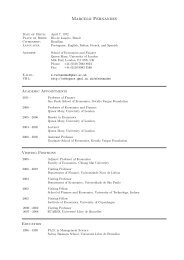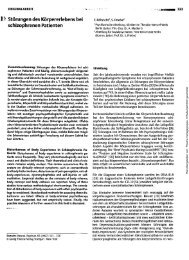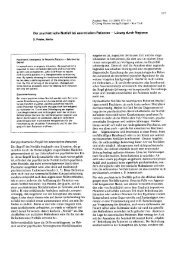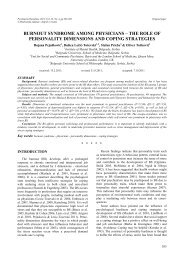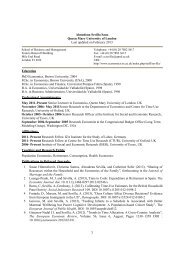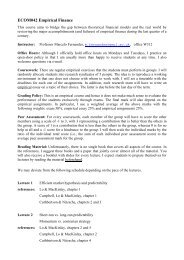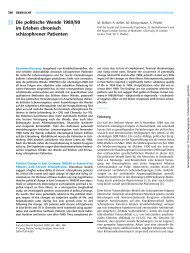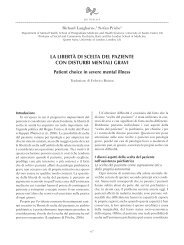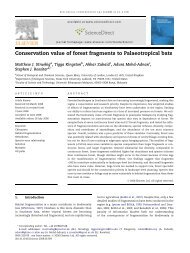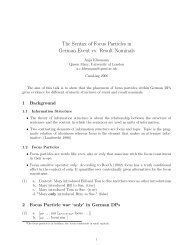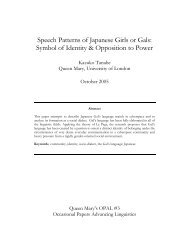Proofs - Personal Webspace for QMUL - Queen Mary, University of ...
Proofs - Personal Webspace for QMUL - Queen Mary, University of ...
Proofs - Personal Webspace for QMUL - Queen Mary, University of ...
Create successful ePaper yourself
Turn your PDF publications into a flip-book with our unique Google optimized e-Paper software.
our study, we composed an assessment tool in the <strong>for</strong>m <strong>of</strong> a<br />
checklist based on them. Because our research is focusing on the<br />
concept <strong>of</strong> “intercultural opening” as it moves at an abstract and<br />
cross- institutional level, tailoring different modules <strong>for</strong> different<br />
settings <strong>of</strong> institutions was deemed unnecessary. For general<br />
in<strong>for</strong>mation about the institutions in the study, we used one part<br />
<strong>of</strong> a questionnaire from a <strong>for</strong>mer study project. The preliminary<br />
assessment tool we developed included 17 different parts and<br />
17.5 pages.<br />
A further review <strong>of</strong> the instrument was essential in order<br />
to insure that the developed tool incorporated all facets <strong>of</strong><br />
“intercultural opening”, that it was applicable to every type <strong>of</strong><br />
institution later assessed and to shorten it. We used two methods<br />
combining theoretical and practical views in two subsequent<br />
steps.<br />
3.2. Web- based, two- round<br />
consensus- oriented Delphi process<br />
As the concept <strong>of</strong> “intercultural opening” is an expertdesigned<br />
concept, in a fi rst step, we used a web- based expert<br />
interview, based on a two- round consensus- oriented Delphi<br />
process [21] to review the developed instrument <strong>for</strong> missing<br />
aspects <strong>of</strong> the instrument and, if possible, to shorten it.<br />
The general idea <strong>of</strong> the Delphi approach is to collect expert<br />
opinions on a topic in successive interview rounds and to publish<br />
the anonymous results from each round to everybody in the<br />
next round. Some Delphi approaches are consensus- oriented,<br />
which means that the desired goal <strong>of</strong> the Delphi process is<br />
consensus. The number <strong>of</strong> participants in Delphi processes<br />
has varied in other studies [11]. We decided to interview 12<br />
leading German experts (see acknowledgment) with experience<br />
and/or expertises in the fi elds <strong>of</strong> immigration, improving<br />
access to care <strong>for</strong> migrants, and the concept <strong>of</strong> “intercultural<br />
opening”. These experts come from both scientifi c and practical<br />
background, which also speaks to their different views on the<br />
topic <strong>of</strong> “intercultural opening”. The participants were chosen<br />
by conducting a research <strong>for</strong> experts in these fi elds as well<br />
as by recommendations <strong>of</strong> experts [11]. They were contacted<br />
by email and asked <strong>for</strong> their participation. Only four out <strong>of</strong><br />
the twelve selected experts declined participation and were<br />
substituted by four different recommended experts from the<br />
same areas as those who had declined to participate. One expert<br />
had to be excluded after the fi rst round due to incomplete<br />
answers.<br />
3.2.1. First round <strong>of</strong> Delphi process<br />
The first round <strong>of</strong> the Delphi process via internet was<br />
conducted from October 2010 until early January 2011. A<br />
website was created displaying the preliminary assessment<br />
tool as developed to that point. In the fi rst round, three questions<br />
were used to evaluate each item in the assessment tool<br />
and its corresponding response categories. The fi rst question<br />
concerned the signifi cance <strong>of</strong> the particular items in the context<br />
<strong>of</strong> “intercultural opening”, with the response categories “very<br />
important”, “important”, “less important” and “not important<br />
S. Penka et al. / European Psychiatry 27 (2012) / supplement n°2 / S63-S69 S65<br />
at all”. The other questions asked <strong>for</strong> an assessment <strong>of</strong> the question’s<br />
wording and <strong>for</strong> comments on the questions/items and<br />
response categories in general. Overall 170 items had to be rated<br />
by the interviewed experts. After the data were collected, the<br />
results <strong>of</strong> the fi rst round were analysed.<br />
Because <strong>of</strong> our primary goal <strong>of</strong> shortening the tool, essential<br />
criterion were defi ned as being rated “important” or “very<br />
important” by every expert. Each item that was judged as either<br />
“important” or “very important” by all experts (“Md” 12) was<br />
considered consensual and essential <strong>for</strong> determining the status <strong>of</strong><br />
“intercultural opening”. Items reaching this criterion were kept<br />
in the assessment tool. Those which did not reach the criterion<br />
were presented again <strong>for</strong> evaluation in the following round.<br />
3.2.2. Results <strong>of</strong> the fi rst round <strong>of</strong> Delphi process<br />
In the first round, 62 items reached the definition <strong>of</strong><br />
consensus and were there<strong>for</strong>e approved <strong>for</strong> use in the assessment<br />
tool, thus playing no further role in the second round.<br />
108 items, on the other hand, had failed this condition, not<br />
having been judged as “important” or “very important” by all<br />
experts. However, the majority <strong>of</strong> these items were judged as<br />
less or not important by only one or two experts. 41 items, <strong>for</strong><br />
example, had been rated by only one expert as “less important”,<br />
while 13 by only one expert as “not at all important”.<br />
54 items thereby only reached Md= 10 within the fi eld <strong>of</strong><br />
“importance”. 31 items had been judged by two experts as<br />
not (very) important (Md= 9).<br />
In addition, we worked some changes into the questionnaire<br />
based on the comments given regarding the open questions.<br />
Some items were made more specifi c, as experts had told us that<br />
they could easily be misunderstood. Some response categories<br />
were added that experts had missed. Some questions were split<br />
into two, which explains the higher number <strong>of</strong> items to be judged<br />
in the second round.<br />
<strong>Pro<strong>of</strong>s</strong><br />
3.2.3. Second round <strong>of</strong> Delphi process<br />
The second round <strong>of</strong> Delphi process took place between<br />
January and February 2011. We displayed the revised questionnaire<br />
on the website. Only the 116 items and the corresponding<br />
response not found consensual in the fi rst round were included.<br />
Every participant was asked to evaluate them again. We published<br />
the ratings <strong>of</strong> each <strong>of</strong> these items in the fi rst Delphi round.<br />
In order to get new refl ections and judgement <strong>of</strong> the topic and<br />
to avoid simple repetition, we did not in<strong>for</strong>m participants about<br />
their own previous judgements [11].<br />
3.2.4. Results <strong>of</strong> the second round <strong>of</strong> Delphi process<br />
We analysed the collected data using the same criterion<br />
as in the fi rst round. However, after the second round items<br />
which did not reach the criterion <strong>of</strong> consensus were taken<br />
out <strong>of</strong> the assessment tool. 65 items reached consensus in the<br />
second round while 51 did not. Again the majority <strong>of</strong> these<br />
items were judged as less or not important by no more than



